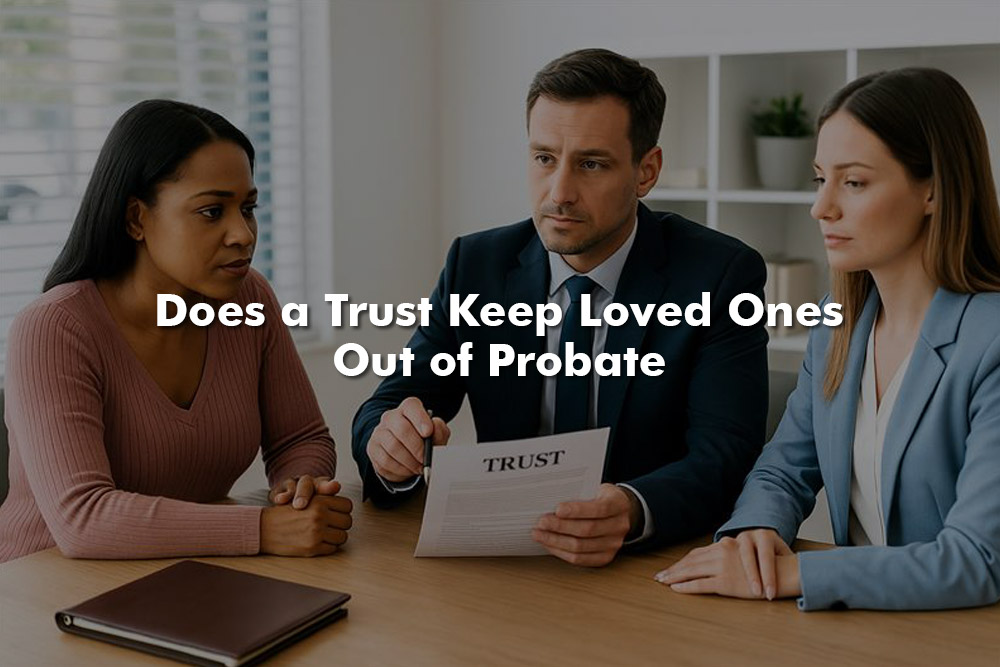Estate planning often brings up the question: how do I make things easier for my loved ones after I’m gone? One of the most effective tools to simplify the inheritance process and protect your family from lengthy legal proceedings is a living trust. But does a trust actually keep your loved ones out of probate? In most cases, the answer is yes—if the trust is properly set up and maintained.
At Allenby Law, we believe in estate planning that’s both smart and simple. We’ll walk you through how trusts work, how they help avoid probate, and what you need to know to make sure your plan truly protects your family.
What Is Probate?
Probate is the legal process that occurs after someone passes away. It involves:
- Validating the will (if there is one)
- Identifying and valuing assets
- Paying debts and taxes
- Distributing remaining assets to heirs
In California, probate can be time-consuming, expensive, and public. It may take 9 to 18 months or longer, and court fees, attorney costs, and administrative expenses can consume a significant portion of the estate—especially if disputes arise.
Probate is also part of the public record, meaning that details about your assets and beneficiaries can become accessible to anyone.
What Is a Trust?
A revocable living trust is a legal document that holds and manages your assets during your lifetime and distributes them after your death—without involving the probate court.
Here’s how it works:
- You (the grantor) create the trust and transfer ownership of your assets into it.
- You usually name yourself as the trustee (manager) and a successor trustee to take over upon your death or incapacity.
- The trust includes instructions for how your assets should be distributed.
- When you pass away, the successor trustee carries out those instructions privately and without court oversight.
Because the trust—not you personally—owns the assets, there is no need for the court to get involved in distributing them.
Does a Trust Always Avoid Probate?
A properly funded trust almost always avoids probate, but there are important conditions:
1. The Trust Must Be Fully Funded
Creating a trust is only the first step. You must also transfer assets into the trust, such as:
- Real estate
- Bank accounts
- Investment accounts
- Business interests
- Valuable personal property
If assets are left outside the trust and not covered by a will or transfer mechanism (like a beneficiary designation), they may still go through probate.
2. Beneficiary Designations Must Be Aligned
Certain assets—like life insurance, IRAs, and 401(k)s—don’t go into the trust. Instead, they pass directly to named beneficiaries. If no beneficiary is named, or the named beneficiary is deceased, those assets could go to probate unless a backup plan is in place.
3. Real Estate in Other States
If you own property in multiple states and only use a will, each property may trigger ancillary probate in its respective state. However, placing these properties in your trust helps avoid multiple court proceedings.
4. Disputes or Poor Drafting
If the trust is vague, outdated, or improperly drafted, disputes can arise. Though these situations are rare with proper planning, they can still require court intervention.
Key Benefits of Avoiding Probate with a Trust
1. Saves Time
While probate can take many months or even years, trust administration is typically much faster. Your successor trustee can begin managing and distributing assets almost immediately after your passing.
2. Reduces Costs
Avoiding probate can save your estate thousands of dollars in court fees, legal costs, and executor fees. This means more of your wealth goes to your loved ones.
3. Maintains Privacy
Unlike a will, which becomes public record during probate, a trust is a private document. Your financial details and your beneficiaries’ inheritance remain confidential.
4. Offers Control
A trust lets you control how and when your assets are distributed. For example, you can:
- Delay distributions until a beneficiary reaches a certain age
- Provide monthly or annual income instead of a lump sum
- Include conditions like education goals or substance-free behavior
This is especially valuable when planning for young beneficiaries or those with special needs.
5. Helps During Incapacity
If you become incapacitated, your successor trustee can step in and manage your affairs without the need for a court-appointed conservator. This adds another layer of protection and convenience for your loved ones.
Common Mistakes to Avoid
Even with good intentions, these common mistakes can prevent a trust from doing its job:
Forgetting to Fund the Trust
This is the most frequent oversight. If your assets aren’t retitled into the trust, probate may still be required. We help our clients ensure that each asset is properly transferred.
Failing to Update the Trust
Life changes—marriage, divorce, births, deaths, and major asset acquisitions—can all impact your plan. A trust should be reviewed and updated every few years or after significant life events.
Naming the Wrong Trustee
Your successor trustee should be someone trustworthy, capable, and organized. If you’re not sure who to choose, a corporate trustee or professional fiduciary may be a better option.
What If You Already Have a Will?
A will is still an important backup document and can be used in combination with a trust. For example, a “pour-over will” ensures that any assets not already in your trust at the time of your death are transferred into it. However, these assets would still go through probate before landing in the trust, so it’s better to transfer them while you’re alive.
When a Trust May Not Avoid Probate
There are rare situations where a trust may not fully avoid probate:
- Assets not properly transferred into the trust
- Assets with unclear ownership
- Challenges to the validity of the trust
- Real property held jointly with someone who is not the trust’s beneficiary
Even in these cases, the presence of a trust often simplifies and speeds up resolution.
Why a Trust Is Smart and Simple
At Allenby Law, we often recommend living trusts for clients who want to:
- Avoid probate
- Minimize court involvement
- Maximize privacy
- Reduce expenses
- Protect young or vulnerable beneficiaries
- Maintain control over their legacy
We believe estate planning shouldn’t be a stressful or mysterious process. With a trust, you can protect what matters most and ensure that your loved ones are cared for—without the court getting involved.
How We Can Help
At Allenby Law, we help San Diego families design estate plans that are both smart and simplified. If your goal is to keep your loved ones out of probate and make the inheritance process smooth, creating a living trust is often the most effective step you can take.
We don’t just draft documents—we guide you through the entire process, from funding your trust to coordinating your beneficiary designations and preparing for long-term peace of mind. Whether you’re starting your plan or updating an old one, we’re here to make it easier for you and better for those you leave behind.
Contact Allenby Law today to schedule your personalized estate planning consultation and learn how we can help protect your legacy—without the probate court.



